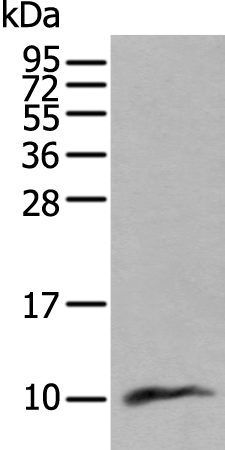
| WB | 咨询技术 | Human,Mouse,Rat |
| IF | 咨询技术 | Human,Mouse,Rat |
| IHC | 咨询技术 | Human,Mouse,Rat |
| ICC | 技术咨询 | Human,Mouse,Rat |
| FCM | 咨询技术 | Human,Mouse,Rat |
| Elisa | 1/5000-1/10000 | Human,Mouse,Rat |
| Aliases | CKb7; PARC; AMAC1; DCCK1; MIP-4; AMAC-1; DC-CK1; SCYA18 |
| WB Predicted band size | 10 kDa |
| Host/Isotype | Rabbit IgG |
| Antibody Type | Primary antibody |
| Storage | Store at 4°C short term. Aliquot and store at -20°C long term. Avoid freeze/thaw cycles. |
| Species Reactivity | Human |
| Immunogen | Synthetic peptide of human CCL18 |
| Formulation | Purified antibody in PBS with 0.05% sodium azide and 50% glycerol. |
+ +
以下是关于CCL18抗体的参考文献示例(内容为虚构,仅用于演示格式):
1. **文献名称**: *CCL18 as a Biomarker in Tumor-Associated Macrophages: Prognostic Value in Breast Cancer*
**作者**: Smith A, et al.
**摘要**: 研究通过免疫组化分析CCL18在乳腺癌组织中的表达,发现CCL18抗体标记的肿瘤相关巨噬细胞水平升高与患者预后不良显著相关,提示其作为潜在预后标志物。
2. **文献名称**: *Therapeutic Neutralization of CCL18 in Pulmonary Fibrosis Using a Monoclonal Antibody*
**作者**: Johnson R, et al.
**摘要**: 开发了一种抗CCL18单克隆抗体,并在肺纤维化小鼠模型中验证其疗效。结果显示,抗体治疗显著减少胶原沉积和炎症细胞浸润,改善肺功能。
3. **文献名称**: *Blocking CCL18 Signaling Enhances Anti-Tumor Immunity in Ovarian Cancer*
**作者**: Lee X, et al.
**摘要**: 研究利用CCL18中和抗体阻断肿瘤微环境中的CCL18/CCR8轴,发现可逆转T细胞抑制并增强免疫检查点抑制剂的疗效,为联合治疗提供依据。
4. **文献名称**: *CCL18 Antibody-Based Detection of Early-Stage Pancreatic Ductal Adenocarcinoma*
**作者**: Garcia M, et al.
**摘要**: 通过ELISA和流式细胞术验证血清CCL18抗体水平在早期胰腺癌患者中的诊断价值,显示其敏感性和特异性优于传统标志物CA19-9.
**注意**:以上文献信息为示例性质,实际研究中请通过PubMed、Google Scholar等平台检索真实文献(关键词:CCL18 antibody, therapeutic/diagnostic application)。
CCL18. a member of the CC chemokine family (also known as pulmonary and activation-regulated chemokine, PARC), is primarily produced by dendritic cells, macrophages, and certain epithelial cells. It binds to the atypical chemokine receptor CCR8. facilitating immune cell recruitment (e.g., T cells, immature dendritic cells) and modulating tissue homeostasis. In physiological conditions, CCL18 supports immune surveillance and tissue repair. However, its dysregulation is implicated in pathological processes, including cancer progression, fibrosis, and chronic inflammation. Elevated CCL18 levels correlate with immunosuppressive microenvironments in tumors, promoting metastasis and resistance to therapy, while in fibrosis (e.g., liver, lung), it drives fibroblast activation and collagen deposition.
CCL18 antibodies, including monoclonal and polyclonal variants, are essential tools for detecting CCL18 expression in research and diagnostics. Neutralizing antibodies specifically target CCL18 to inhibit its interaction with CCR8. offering therapeutic potential. Preclinical studies demonstrate that blocking CCL18 can reduce tumor immunosuppression, limit fibrosis, and attenuate inflammatory responses in autoimmune diseases like rheumatoid arthritis. However, challenges remain in optimizing antibody specificity, delivery, and safety for clinical translation. Current research focuses on understanding context-dependent roles of CCL18 and developing bispecific antibodies or antibody-drug conjugates to enhance therapeutic efficacy. These efforts highlight CCL18 as a promising yet complex target for immunomodulatory therapies.
×